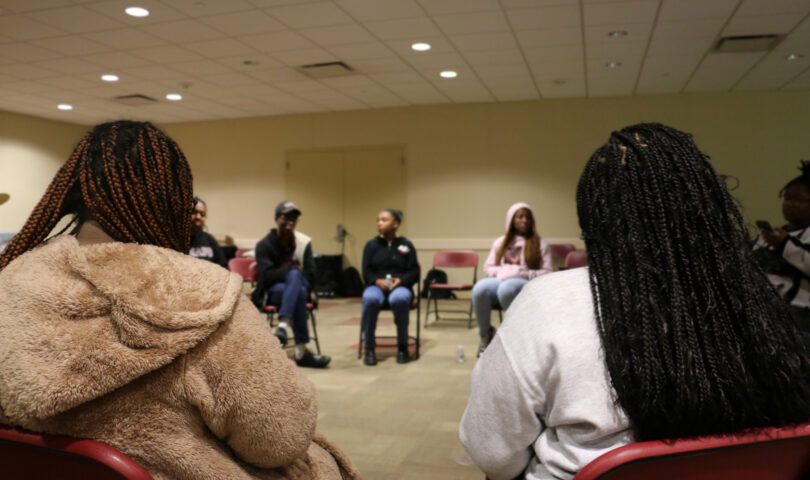The Black Student Union (BSU) is once again opening the floor for sharing grievances and stories with Hot Seat Discussions, a new series running throughout this school year. Similar events were held last year by the BSU, called Hot Wings and Hot Topics, to give Black and brown students a space to discuss pertinent issues while enjoying spicy food.
The first event, Hot Seat Discussions: Let’s Talk About Race, was held in the Alumni Lounges last Thursday. Moderators asked attendees a series of questions, inviting them to open up about their experiences with race.
“As the Black Student Union, we want to be a safe space for Black and brown students, and I think a big part of that is giving them a space to be themselves and talk, and that’s what this event was all about,” said BSU publicist Desiree S. Bounds.
Several students expressed feeling ostracized by Black and white peers alike for not fitting existing stereotypes.
Much of the discussion related to how Ramapo College is a predominantly white institution (PWI); 56% of the student body is white. This racial imbalance can instill feelings of displacement and impostor syndrome in Black and brown students.
Feelings of inadequacy are further aggravated when Black and brown students have weaker educational backgrounds than their white peers. A report from EdBuild indicated American school districts serving mostly students of color receive $23 billion less in funding than those serving a white majority.
“It goes into feeling like I don’t belong here,” said a Ramapo student from Newark. She described feeling like she did not come from the same environment as her white classmates.
Stresses over academics are compounded by pressure to assimilate to the dominant on-campus culture.
When one attendee first came to Ramapo, she felt uncomfortable showing her natural hair and used long straight hair extensions. “I had some people who really inspired me to look at my hair differently and take pride in it, so I went natural.” Cutting her hair and going natural brought her overdue relief. “I felt so, so proud of myself, like I could finally be my 100% authentic self.”
Attendees agreed they felt discomfort when they witnessed the appropriation of Black-originated hairstyles on campus. They cited the long history of Black-originated hairstyles being deemed unprofessional in U.S. workplaces as the main source of discomfort over seeing them being worn now as a fashion statement by non-Black people.
“I think it’s a sign of disrespect to get the hairstyle… At the end of the day, you’ve seen the mental anguish it causes people,” one student said.
“Protective styles were the tools to help me love my natural hair… you just wearing it to be cute completely invalidates all of those emotions Black women are feeling,” said another.
Several students expressed feeling ostracized by Black and white peers alike for not fitting existing stereotypes. One attendee said her love of pop music was continuously greeted with shock. “Music does not necessarily correspond to a color,” she stated.
Several commiserated about being told they “talk white.”
“What do you mean I talk white? I’m just being myself,” one student said. She claimed to be inspired by the character of Carlton Banks from the sitcom “The Fresh Prince of Bel-Air,” who has a relevant quote, “Being Black isn’t what I’m trying to be, it’s what I am.”
Throughout the evening, attendees made it clear that what they wanted most was the freedom to be themselves without the influence of racial biases and stereotypes.
The date and topic of the next Hot Seat Discussion are undecided, but details will be shared via the BSU’s social media. Anyone who is interested is welcome to attend.
“We are a safe space for Black and brown students and any allies of inclusivity. If you are someone who wants to become an ally… I highly encourage you to come to our events,” said Bounds. “Regardless of your race, religion or creed, speaking with people of different identities, learning from people and having empathy for their stories makes us better people.”
dbongiov@ramapo.edu
Featured photo by Danielle Bongiovanni






